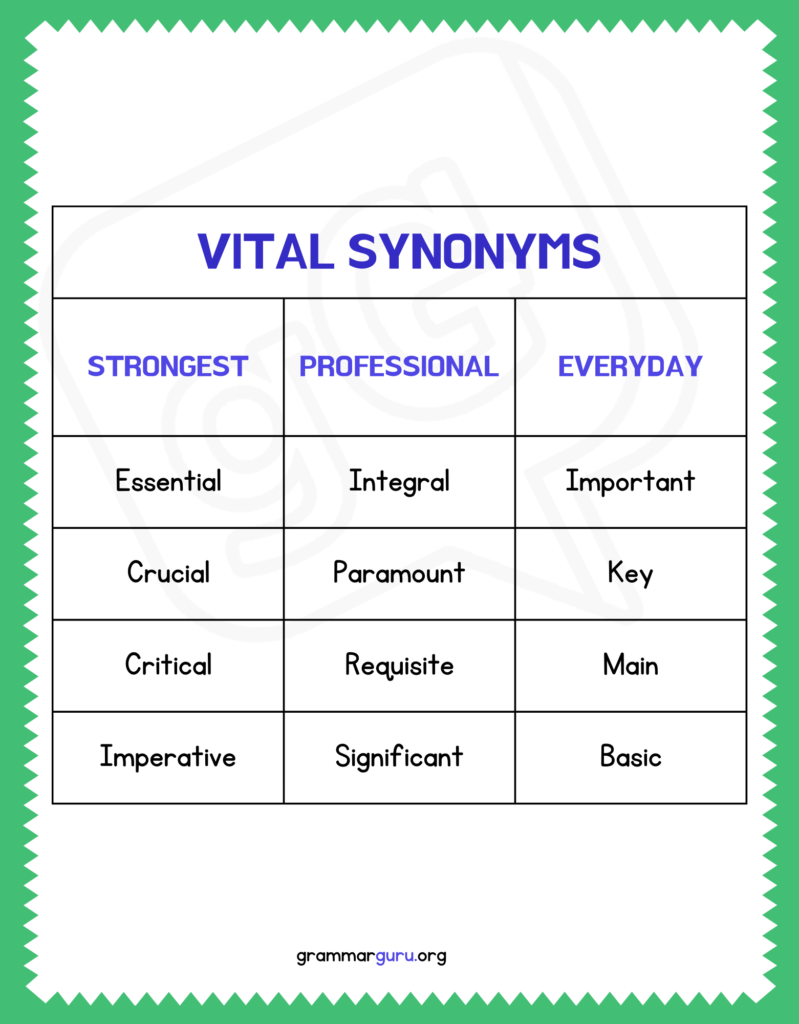Life is full of moments where we need to emphasize the absolute necessity of something. While “vital” perfectly captures this urgency, expanding your vocabulary with vital synonym can help you communicate more precisely and effectively. In this post, we’ll explore various alternatives to “vital” that can enhance your writing and speech.
What Does ‘Vital‘ Mean?
The word ‘vital’ is an adjective that describes something as absolutely necessary or essential for life, success, or effectiveness. It often conveys a sense of urgency or critical importance. For example:
- “Water is vital for survival.”
- “Teamwork is vital to the success of any project.”
The Origin of “Vital” Derived from the Latin word “vitalis,” meaning “of or belonging to life,” vital entered the English language in the 14th century. Initially used to describe organs essential for life, it evolved to encompass anything of crucial importance.
Whether you’re writing an essay, a business report, or a creative piece, “vital” is a go-to word for emphasizing importance. However, using it repeatedly can make your writing feel monotonous. That’s why knowing its synonyms is so valuable.
| Strong/Intense Vital Synonym: | Professional/Formal Vital Synonym: | Common/Everyday Vital Synonym: |
| Essential Crucial Critical Imperative Indispensable Paramount Fundamental Necessary Cardinal Requisite Mandatory Core | Integral Quintessential Elemental Significant Principal Pivotal Substantive | Important Key Basic Central Main Primary Required Needed Must-have |
Vital Synonym Examples
- Vital: Absolutely necessary.
Example: “Water is vital for life.” - Essential: Extremely important.
Example: “Sleep is essential for health.” - Crucial: Critical for success.
Example: “The meeting was crucial.” - Indispensable: Cannot be done without.
Example: “She is indispensable to the team.” - Critical: Of utmost importance.
Example: “Time is critical in emergencies.” - Imperative: Urgently important.
Example: “It’s imperative to act now.” - Pivotal: Key to development.
Example: “The decision was pivotal.” - Fundamental: Basic and necessary.
Example: “Math is fundamental to science.” - Integral: Necessary to complete.
Example: “Teamwork is integral to success.” - Key: Central to importance.
Example: “Planning is key to success.” - Necessary: Required; needed.
Example: “Food is necessary for survival.” - Required: Must be done.
Example: “A license is required to drive.” - Mandatory: Compulsory.
Example: “Attendance is mandatory.” - Requisite: Needed for a purpose.
Example: “Patience is a requisite for teaching.”
Common Mistakes to avoid while using Vital Synonym
- Match the Tone: Use formal synonyms like “imperative” or “indispensable” for professional writing.
- Consider Context: Use “pivotal” when referring to a turning point or a key moment. Use “fundamental” when discussing the basics or core principles.
- Avoid Repetition: Mix and match synonyms to keep your writing fresh and engaging.Even synonyms can lose their impact if used too frequently.

Related Words for Vital Synonym to Consider
- Fundamental (emphasizing basic necessity)
- Pivotal (suggesting a turning point)
- Key (more casual but effective)
Antonyms:
- Optional
- Unnecessary
- Dispensable
Next in our synonym series, we’ll explore alternatives to beautiful or help– stay tuned to enhance your descriptive vocabulary further!
